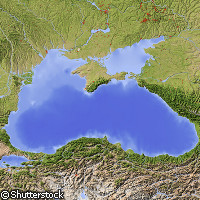EU-funded project links researchers in the Black Sea region with GÉANT
On 17 March the European Commission launched the Black Sea Interconnection (BSI) project, a research and education network linking countries in the South Caucasus with the high-bandwidth, pan-European GÉANT network. The two-year project, coordinated by the Turkish National Research and Education Network (TÜBITAK-ULAKBIM), connects regional research networks in Georgia, Azerbaijan and Armenia and is funded with EUR 1.4 million through the EU's Seventh Framework Programme (FP7). Armenian and Georgian scientists are involved in several European research collaborations, including scientific resource-sharing infrastructures (grids), the Large Hadron Collider (the world's largest and highest-energy particle accelerator) and environmental monitoring of the Black Sea. But the region's current infrastructure is unable to keep up with the scientific community's increasing demands for connectivity and need for high capacity. Large databanks and massive processing power are needed to conduct advanced research, for example predicting and managing epidemics, decoding genetic information or simulating energy demands. Through its connection to the GÉANT network, BSI now provides researchers in the South Caucasus with access to scientific resources in Europe and the massive data processing capacity they need to carry out cutting-edge research. GÉANT2, the high-bandwidth academic network serving Europe's research and education community, connects some 30 million researchers in 34 countries. It links Europe with networks in Central Asia, the Asia Pacific region, Latin America, South Africa, the US and Canada. GÉANT also enables access to remote resources (such as telescopes) that are sometimes too costly for a single country to develop. BSI connects 377 universities and research institutes in Armenia, Azerbaijan and Georgia to the GÉANT network with significantly improved speed (from a minimum of 34 to 100 Megabits per second, Mbps). Now, advanced services such as internet protocol 6 (a potentially unlimited source of internet addresses) and multicast, which allows for smoother video streaming, will be possible. According to the Commission, this represents a 'quantum-leap in terms of performance and international connectivity made available to the science and research community in the Southern Caucasus'. According to Armenian Prime Minister Mr Tigran Sargsyan, 'Our researchers and students have previously found their efforts at collaboration hampered by a lack of high-speed connectivity within the region, and vitally to Europe. IT development is the most important task to achieve the Armenian government's primary goal of the national economy being driven by science and modern technology. The BSI project will provide the infrastructure we need to share knowledge amongst our peers, to enlarge scientific research collaboration and bring new technology and science to Armenia.' BSI allows universities to use advanced communication for better scientific collaboration and will make new research tools available to scientists in the Black Sea region. Importantly, participating national networks and local universities will provide training and support to the region's schools, which in many cases do not have the background necessary to operate a local school network. Georgian Vice Prime Minister George Baramidze said, 'BSI is the most important step in the last few years to integrate the Georgian research and education community in Europe. It will make it possible for Georgian scientists to run complex applications such as GRID computing and provide access to world-class experiments like the Large Hadron Collider (LHC) at CERN.' 'By investing EUR 1.4 million funding in this project, we will bridge a major digital divide by connecting scientists from the Black Sea region to the global research community, providing high speed internet connections to universities and research centres in the South Caucasus,' said Viviane Reding, EU Commissioner for Information Society and Media. 'I expect better collaboration with GÉANT's 4,000 EU research institutions will lead to better research and better results in Europe and beyond.' Azerbaijan Minister of Telecommunication and IT Professor Ali Abasov stated, 'The BSI project is of crucial importance for our scientific community [...] whose needs are growing rapidly. BSI is a much-needed complementary contribution to our country's ICT strategy, which is the realisation of President Ilham Aliev's vision to make ICT the second most important area of our economy, after oil.' Commissioner Benita Ferrero-Waldner, EU Commissioner for External Relations and European Neighbourhood Policy, added that BSI should also make possible a 'collaborative infrastructure that also supports the future introduction of new online services such as e-Government, e-Business, e-Health and the use of information and communication technology in education benefiting society as a whole.' GÉANT is a global leader in research networking owing to its hyper-fast technology and use of 'dark fibre' for individual high-speed links to advanced research communities. BSI stems from an earlier EU-funded project, 'Porta Optica' and replaces the NATO-funded 'Virtual Silk Highway'.
Countries
Armenia, Azerbaijan, Georgia



